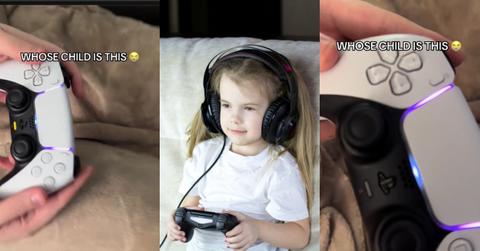“Coparenting in the Lobby” — Gamer Tells Kid Playing Online He Should Stop and Listen to His Mother
"As a mom who's had this happen thank you."
Published Oct. 15 2024, 4:33 p.m. ET
A Playstation 5 gamer is being applauded for how they handled hearing a fellow online gamer, a child, argue with their mother about wanting to play their game more instead of taking a shower.
Marcus (@mdeethegamer) posted a viral TikTok airing the conversation the young gamer had with his mother. The clip also features Marcus getting in on their conversation via PS5's online chat feature to let the kid know that he should listen to his mom.
"WHO'S CHILD IS THIS?" a text overlay in the video reads. The clip begins with the camera focusing on someone holding a Playstation 5 controller. A voice can be heard emanating from the handset. It appears to be someone Marcus is playing with online, a young kid who is in conversation with their mother.
The woman's voice can be heard on the other end of the controller and she's telling her kid that they "better" stop playing the video game. "Let's go, now!" she says right after explaining that he needs to take a shower immediately because she has to take one after he does.
It sounds like the young man says no to her. "You want to talk back one more time?" Mom says to him as Marcus continues to listen in on their conversation. "Fine," the young man replies before Marcus interjects. The TikToker taps a button on his controller, unmuting it.
"Get off the game and go take your shower," he says, tapping the mute button again. "Get your butt upstairs," the mom can be heard saying to the young man as Marcus puts the controller in his hands again. He unmutes the handset again: "You better listen to your mom and get off this game."
The young man then asks aloud: "Uhhh, who said that?"
Marcus presses the mute button once again to inform the young man he's playing with that he needs to listen to his mother again: "You better respect your mom, she told you to get off the game."

"So get off the game," he says, continuing to lecture the young man that he needs to stop playing when his mother tells him to do so. "I want to finish this I just started," the child replies.
Marcus then informs the child that what he wants to do right at that moment isn't important, and that his mother's requests take precedence. "That doesn't matter you're supposed to listen to your mother. Don't be disrespecting your mom."
"Bro these kids nowadays are out of pocket," he adds in a caption for the video.
The National Library of Medicine published a study titled "Video Gaming and Children's Psychosocial Wellbeing." In the piece, the abstract states that the mental health effects of video games on children are still up for debate.

The paper states: "Violent gaming was not associated with increases in externalizing problems, and for children playing approximately eight hours or more per week, frequent competitive gaming may be a risk factor for decreasing prosocial behavior. We argue that replication is needed and that future research should better distinguish between different forms of gaming for more nuanced and generalizable insight."
However, there are parents who've expressed worry that their children may be investing too much time in playing video games. This NPR article also echoes the aforementioned NLM piece on gaming and kids' mental health. In the article, clinical psychologist Kelli Dunlap of the mental health advocacy group Take This spoke about the correlation between gamers and mental health.

"Research has shown again and again and again, time spent playing video games is not predictive of mental health outcomes," she says.
However, folks who are worried kids prioritize video games over real-world activities say that parents should focus on ensuring their children are giving more energy to "offline activities."
Pediatrician Michael Rich, who is a director of the Center of Media and Child Health at Boston Children's Hospital, says he wants to "bring back boredom." By not constantly relying on screens and external mental stimuli, Rich hopes to attain this. "Screen time is a hard thing to quantify," Rich states.
"What is easier to quantify — and probably more in line with what is developmentally optimal — is quantifying non-screen time," the pediatrician stated.
He added that family time, outdoor activities, and chores aren't cast aside in favor of children playing video games.

With that being said, Rich says that asking kids about the games they play and what they find enticing about them can be a good way for folks to connect with their children and discover what it is they like.
